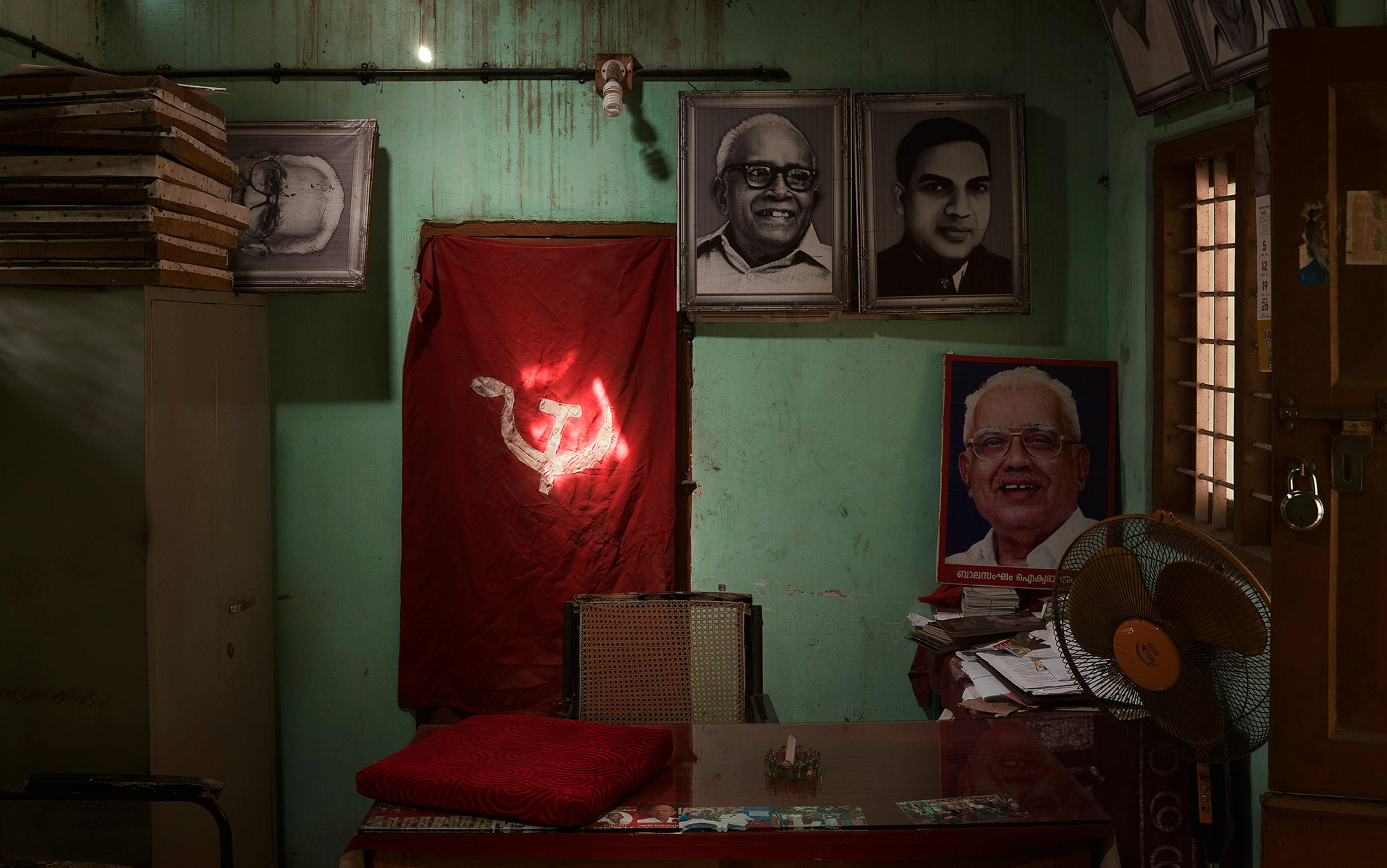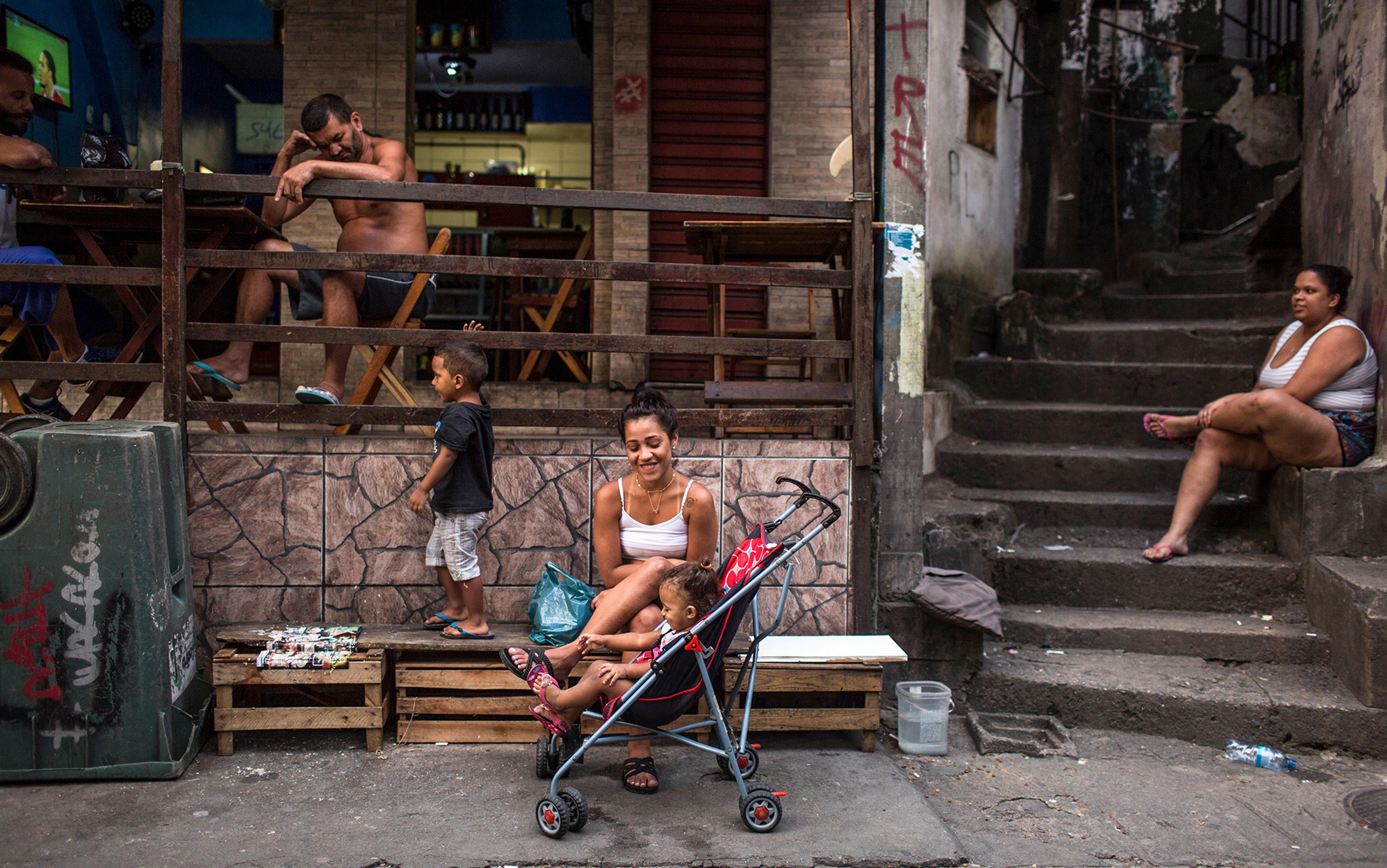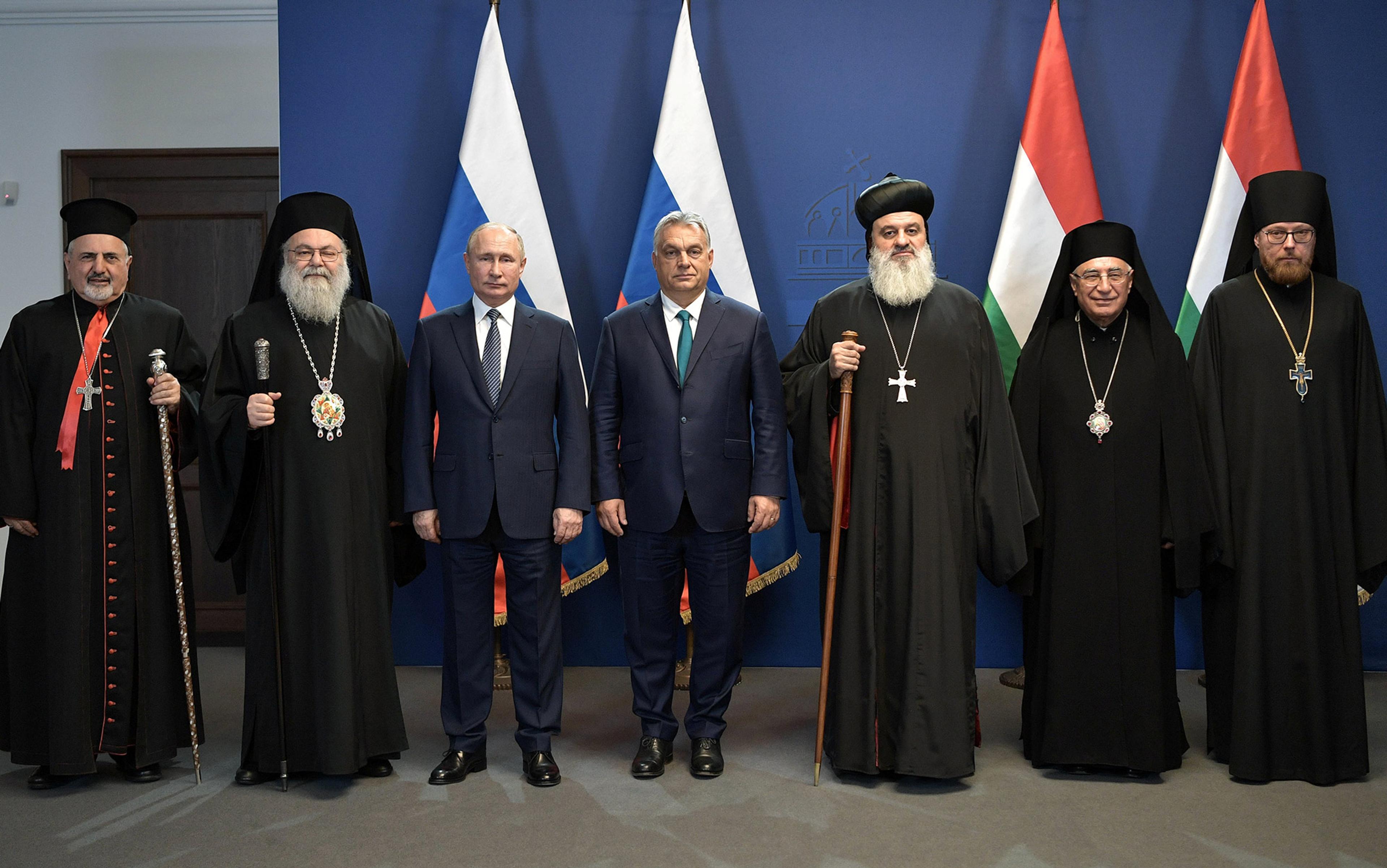Utopia is on the horizon … I move two steps closer; it moves two steps further away. I walk another 10 steps and the horizon runs 10 steps further away. As much as I may walk, I’ll never reach it. So what’s the point of utopia? The point is this: to keep walking.
– from Las palabras andantes (1993), or Walking Words, by Eduardo Galeano
In 1856, Thomas Ewbank published Life in Brazil, an account of the Englishman’s six months spent in the country a decade earlier. In it, he argued that Catholicism as practised in Brazil and across Latin America constrained material progress. In this, the visitor would be joined by a long line of critics, from the writer and later modernising president of Argentina, Domingo Faustino Sarmiento – who denounced the negative influence of Spanish and Indigenous cultures in Latin America, including the role of the Catholic Church – to the conservative Harvard academic Samuel Huntington.
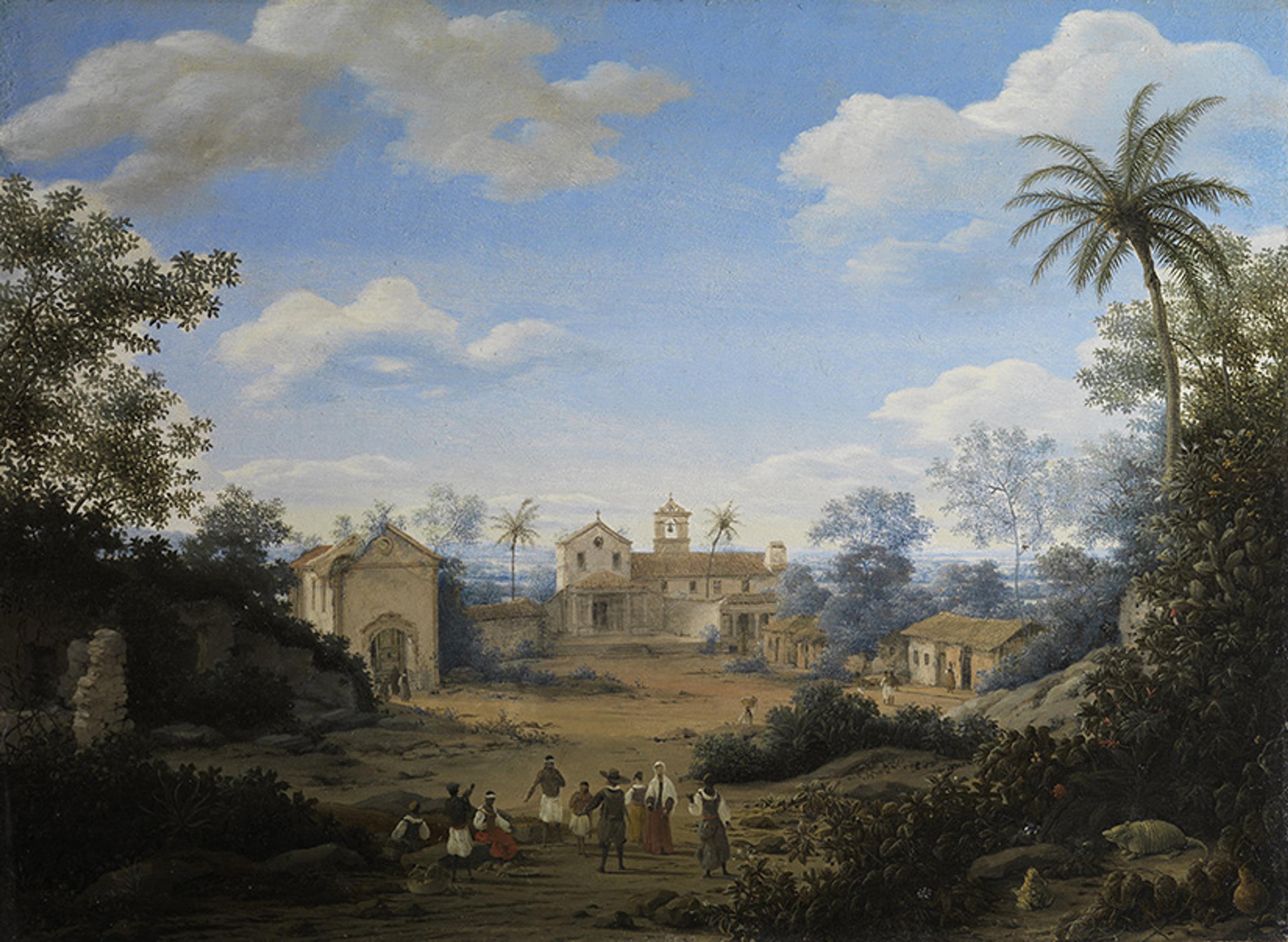
The Church of St Cosmas and St Damian and The Franciscan Monastery at Igaraçu, Brazil (c1663) by Frans Jansz Post. Courtesy the Museo Nacional Thyssen-Bornemisza, Madrid
Ewbank contended, moreover, that the ‘Nordic sects will never flourish on the Tropics,’ a line that Brazil’s greatest historian, Sérgio Buarque de Holanda, immortalised in his work Raízes do Brasil (1936), or Roots of Brazil. Protestants would supposedly degenerate here, with the severity, austerity and rigour of that doctrine being incompatible with the archetypal Brazilian: the ‘cordial man’. This figure, according to Holanda, represented interpersonal warmth and openness, in contrast to closed and rule-bound northern Europeans.
At present, Protestants account for one-third of the population, while the number of Catholics has just dipped below 50 per cent. By far the largest proportion of Brazilian Protestants are evangelicals, specifically Pentecostals, neo-Pentecostals and related branches. By the centenary of Raízes do Brasil in 2036, Protestants will outnumber Catholics in Brazil for the first time in the country’s 500-plus-year history.
In 2018, the far-Right former army captain Jair Bolsonaro shocked the country by winning the presidency, bolstered by an evangelical vote that would remain faithful to him and his socially conservative, politically reactionary and cosmologically apocalyptic politics.
The rise of this bloc presents a challenge to perhaps the most clichéd description of Brazil. In 1941, the Austrian Stefan Zweig, seeking refuge from Nazism in Brazil, called this land the ‘country of the future’. Zweig highlighted not just Brazil’s natural endowments but the society’s tolerance, openness, harmony, optimism and fusionist culture.
For Zweig, as for many Europeans and Americans before him, Brazil became a utopian gleam in the eye. For centuries, certain common threads had sewn these utopian visions together: Brazil was a picture of idleness, imagination, diversity and conviviality – a means of living together that relied on adaptability. Yet the Bolsonarismo phenomenon, according to critics, is intolerant, punitive, supremacist, an embodiment of a type of Christian cosmovision at odds with any notion of society. Did the presidency of Bolsonaro, under the slogan ‘Brazil above everything, God above everyone’, signal an end of this romance?
No one holds Brazil as an existing paradise. Few even sustain any expectation that it will deliver on what was promised for it. And, indeed, utopian thinking probably died as far back as the 1964 military coup. But many have continued to uphold the country’s cultural traits as admirable and enviable – even models for the world.
‘Brazilianization’, a trope taken up by various intellectuals in recent decades, signals a universal tendency towards social inequality, urban segregation, informalisation of labour, and political corruption. Others, though, have sought to rescue a positive aspect: the country’s informality and ductility, particularly in relation to work, as well as its hybridisation, creolisation and openness to the world, made it already adapted to the new, global, postmodern capitalism that followed the Cold War.
By the 2000s, Brazil was witnessing peaceful, democratic alternation in government between centre-Left and centre-Right for practically the first time in its history. Under President Lula, it saw booming growth, combined with new measures of social inclusion. But underneath the surface of the globalisation wave that Brazil was surfing, violent crime was on the up, manufacturing was down, and inclusion was being bought on credit.
‘There is indeed an alternative, even if it is an apocalyptic one’
In 2013, it came to a shuddering halt. Rising popular expectations generated a crisis of representation – announced by the biggest mass street mobilisations in the country’s history. This was succeeded by economic crisis and then by institutional crisis, culminating in the parliamentary coup against Lula’s successor, Dilma Rousseff. Now all the energy seemed to be with a new Right-wing movement that dominated the streets. It was topped off by the election of Bolsonaro in 2018. Suddenly, eyes turned to the growing prominence of conservative Pentecostal and neo-Pentecostal outlooks in national life.
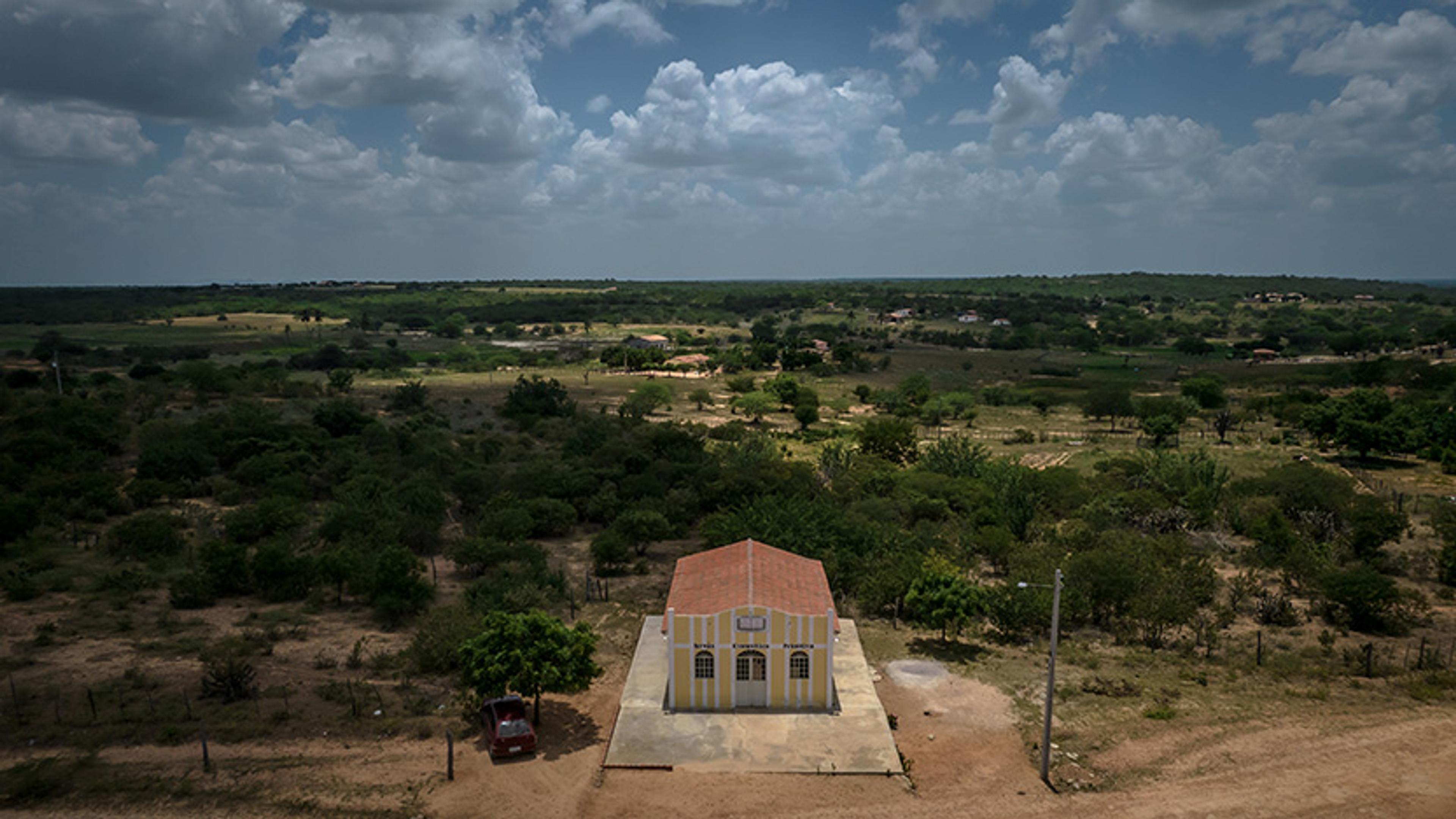
An evangelical church near Salgueiro, Pernambuco state, Brazil, February 2022. Photo by Jonne Roriz/Bloomberg/Getty
Bolsonaro failed to be re-elected in 2022. Upon his defeat, Folha de S Paulo, Brazil’s paper of record, reported that, ‘Bolsonarista pastors talk of apocalypse.’ At the evangelical Community of Nations church in Brasília, frequented by Michelle Bolsonaro, wife of Jair, the pastor’s wife is reported to have proclaimed: ‘Brazil has an owner. That hasn’t changed, it won’t change. God continues to be the one who made Brazil shine and be the light of the world. His plan has changed neither with regard to us nor the country.’ It was a rare expression, for our times, of a sense of historical mission or destiny. The age of no alternative was being left behind. ‘There is indeed an alternative, even if it is an apocalyptic one,’ the Brazilian philosopher Paulo Arantes sardonically remarked.
In the final 2022 pre-election poll, evangelicals split 69-31 in Bolsonaro’s favour. Although he is Catholic, he was baptised in the River Jordan in 2016 by Pastor Everaldo, an important member of the Pentecostal Assembleia de Deus (the Assemblies of God – the largest Pentecostal church in the world, and the largest evangelical church in Brazil).
The creationist and anti-gay Pentecostal Marcelo Crivella shocked many when he defeated a human rights activist to become mayor of Rio de Janeiro in 2016. Crivella’s uncle is Edir Macedo, the founder of the neo-Pentecostal Universal Church of the Kingdom of God (Igreja Universal do Reino de Deus, or IURD), the largest of its denomination, reputedly with 4.8 million faithful in Brazil. Preaching the ‘prosperity gospel’, according to which commitment to the church will be rewarded with wealth, has seen Macedo become a dollar billionaire (of which there are around 60 in the country). The IURD is known for practising exorcisms and divine cures, and for purging demonic spirits, which it associates with Afro-Brazilian religions like Candomblé and Umbanda. But it is the IURD’s political role and media presence that really make it stand out.
The Republicanos party, founded in 2005, is a creature of the IURD. Its president, the lawyer Marcos Pereira, was a bishop who held a position in the Michel Temer administration that took office after deposing of Rousseff. The party’s 44 deputies in the lower house of Congress are part of the powerful cross-party evangelical bench in Congress, composed of 215 deputies out of a total of 513. Macedo also owns Record, the second-biggest channel in Brazil, which gave Bolsonaro plenty of free airtime.
The articulation between evangelicals and Bolsonaro only strengthened through his term. During the COVID-19 pandemic, Bolsonaro’s denial of the severity of the virus was, in part, a demonstration of evangelical coronafé, or corona-faith: ‘that confidence, that certainty that God is with you and that he will never, ever, at any time fail those who have believed in him,’ in Macedo’s words. Later in his term, Bolsonaro nominated the ‘terribly evangelical’ Presbyterian pastor André Mendonça to an empty Supreme Court seat. Upon Congressional approval, the president’s wife Michelle, a crucial link to the evangelical public, was filmed crying, praying and speaking in tongues.
Bolsonarismo is a sort of parody of Christian eschatology
After Bolsonaro left office, his supporters stormed government buildings in Brasília on 8 January 2023, in a replay of the storming of the United States Capitol on 6 January 2021. The action was widely unpopular. But 31 per cent of evangelicals supported it, against a national average of 18 per cent. While 40 per cent of the population believed Lula had not won the election fairly, among evangelicals this belief was as high as 68 per cent, with 64 per cent in favour of a coup to overturn the result. The media was full of reports of pro-Bolsonaro protestors praying for miracles, speaking in tongues and behaving like the world was ending.
The theologian Yago Martins, whose videos on religious thought have won him more than 1 million followers across his social channels, refers to Bolsonarismo as an apocalípse de palha, or ‘straw apocalypse’. Bolsonarismo’s combination of a conspiratorial mindset, a longing for an imminent national conflagration, a holy war against evil, and its messianic discourse are a sort of parody of Christian eschatology. For Martins, author of A religão do bolsonarismo (2021), or Bolsonarismo as Religion, the movement is a ‘fallacious immanentisation of the eschaton’, a paraphrase of the philosopher Eric Voegelin’s phrase from 1952.
Martins, a Baptist pastor, identifies as a Right-wing evangelical, but is a critic of Bolsonarismo (though he admits to voting for him in 2018). His criticisms of Bolsonarismo’s idolatry nevertheless testify to something new on the scene: the insertion of a transcendental viewpoint into politics, something that had supposedly been expulsed with the historic defeat of socialism and nationalism.
Indeed, when I spoke to Gedeon Freire de Alencar, a sociologist of religion and author of a book on the contribution of evangelicals to Brazilian culture, as well as a presbyter of the Bethesda Assembly of God in São Paulo, he emphasised the role of dominion theology, according to which believers should seek to institute a nation governed by Christians. The ‘Seven Mountain Mandate’, popularised in 2013 by two American authors, advocates that there are seven areas of life that evangelicals should target: religion, family, government, education, media, arts/entertainment, and business.
For many progressives, this struck as a sort of ‘medieval radicalism’, the charge thrown at Crivella by Jean Wyllys, the first gay-rights activist to win a seat in Congress. The philosopher and columnist Vladimir Safatle denounced the ‘project to take Brazil back to the Middle Ages’: yes, Brazil had had its share of authoritarian and conservative figures in the past, but this was new, ‘because the old Right… never needed spokespeople.’
As testament to the growing presence of evangelicals but also their political ambivalence, consider the March for Jesus. The yearly demonstration is known as ‘the world’s largest Christian event’ drawing between 1 and 3 millions crentes, or believers, each year. Though Bolsonaro was the first president to attend the march, in 2019, it was Lula who signed the law that officialised the National Day for the March for Jesus, scheduled for 60 days after Easter.
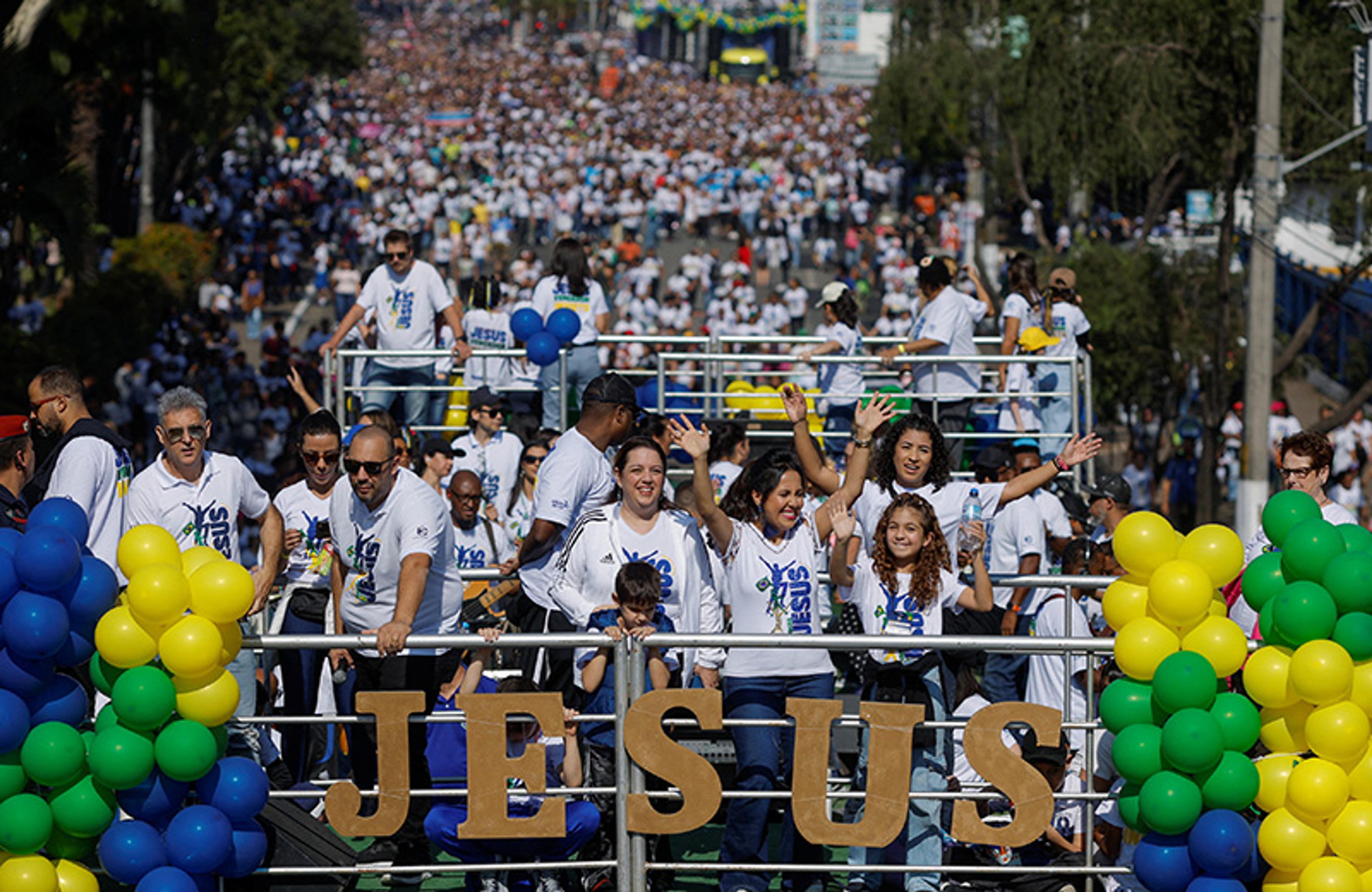
Evangelicals attend the March for Jesus in Sao Paulo, Brazil, 8 June 2023. Photo by Amanda Perobelli/Reuters
Similarly, back in 1997 it was estimated that one-third of militants in the agrarian land reform movement, MST, were Pentecostals, which would have been double the rate of the local population at the time. Twenty years later, Guilherme Boulos, coordinator of the MTST, the unhoused workers’ movement, claimed that by far the largest part of the movement’s base was made up of Pentecostals.
So why the association of evangelicals with darkest reaction? In large part, it’s class prejudice, argues the anthropologist Juliano Spyer, whose book Povo de Deus (2020), or People of God, sparked widespread debate in the country and was a finalist in Brazil’s most prestigious nonfiction prize in 2021. For opinion-formers, the evangelical is either a poor fanatic or a rich manipulator, but the reality is that the religion is socially embedded in Brazil, particularly among the poor and Black population.
The Brazilian urban landscape sees a war of all against all play out every day
For instance, well-to-do social progressivism tars evangelical religion as patriarchal. Perhaps so, in contrast with contemporary upper-middle-class mores, but in the often machista and violent lifeworld of the Brazilian working class, when a man is born-again, he stops drinking, becomes less likely to beat his wife, and is more inclined to contribute to the household. Similarly, while evangelicals are held to be anti-science and anti-enlightenment, in a culture in which even the elite has never been particularly bookish, conversion is associated with a renewed emphasis on study. This partly explains why Pentecostalism (and evangelical Christianity more broadly), is the faith of the world’s urban poor. And ‘Brazil is ground zero for what is happening within the wider Pentecostal movement, the median global experience,’ explains Elle Hardy, author of a book Beyond Belief (2021) on the phenomenon’s spread worldwide.
The evangelical movement must be understood in relation to the reality in which real political corruption abounds, and violence and the threat of violence is omnipresent in the working-class urban context. Brazil now sees more than 50,000 murders a year, and the violence associated with criminal markets, especially drugs, is only the sharp end of a fully marketised society. The Brazilian urban landscape sees a war of all against all play out every day. Middle-class Brazilian progressives were happy to ignore the civil war raging in the urban peripheries until the violence found a spokesperson in Bolsonaro.
Broadly, the term evangélicos refers to missionary Protestants who are not members of the historic Protestant churches in Brazil – the Presbyterians, Lutherans, Anglicans, Methodists, Adventists and Baptists who first arrived from Europe in the 19th century.
Confusingly, many historic Protestant churches carry the name ‘evangelical’ in their titles, and some have now come to adopt modes of worship evocative of charismatic or revivalist churches. But a distinction remains: historic Protestants in Brazil normally call themselves protestante or cristão, not evangélico or crente – and they tend to be middle class.
Pentecostalism arrived in Brazil in the early 20th century, taking root among the poor. Its emblematic church is the Assembleia de Deus, established by two Swedish Baptist missionaries who arrived in the Amazonian port city of Belém in 1910. The third wave, beginning in the 1950s, is marked by the arrival of the Foursquare Church (Igreja Quadrangular), and coincides with rapid industrialisation and urbanisation, with worshipers recruited over the airwaves. But even by 1970, evangelicals still accounted for only 5.2 per cent of the population, while Catholics were at 91.8 per cent.
The establishment of the IURD in 1977 marks the arrival of neo-Pentecostalism and the start of the fourth wave. Proselytising is carried out via TV and, doctrinally, a more managerial ethos is introduced. To the Pentecostals’ direct, personal and emotional experience of God is added the idea that conversion leads to financial advancement – the prosperity gospel. Macedo’s church also exemplified the movement’s growing political confidence. By the 1980s, the slogan crente não se mete na política (believers don’t get mixed up in politics) was being replaced by irmão vota em irmão (brothers vote for brothers).
Throughout, the share of Catholics in the population was falling, with an almost commensurate rise in evangelicals – by about 1 per cent per decade. But, as of 1990, this accelerates to a 1 per cent change per year. Catholics were still 83 per cent of the population in 1991 and 74 per cent in 2000, when Catholicism hit its peak in absolute terms, with 124.9 million Brazilians – making Brazil the largest Catholic country in the world, a title it still holds. But by 2010, the share of Catholics had fallen to 64.6 per cent, with evangelicals rising to 22.2 per cent. Today, evangelicals represent a third of the population, and Catholics just under half. Modellers have identified 2032 as the year of religious crossover, when each Christian camp will account for an equal share of the population: 39 per cent.
Any evangelical entrepreneur with a Bible under his arm and access to an enclosed space can set up shop
What explains this explosion? The anthropologist Gilberto Velho points to inward migration, the primary 20th-century phenomenon in Brazil. Tens of millions of poor, illiterate, rural and profoundly Catholic people from the arid northeast of Brazil migrated to big cities, especially in the industrial southeast. Spyer tells me they ‘lived through the shock of leaving the countryside for the electricity of the city – but also the shock of moving to the most vulnerable parts of the city.’ The loss of networks of support, particularly of extended family, was filled by the establishment of evangelical churches. This is why the geographer Mike Davis called Pentecostalism ‘the single most important cultural response to explosive and traumatic urbanisation’.
Sixty years ago, Brazil’s population was evenly split between town and country. Now it is 88 per cent urban, comparable with infinitely richer Sweden or Denmark, and higher than the US, the UK or Germany. The urbanisation rate is also much higher than Brazil’s fellow BRICs, China (66 per cent) or South Africa (68 per cent). Over the past decades, Brazil has also suffered ‘premature deindustrialisation’ – the loss of manufacturing jobs on the scale of the UK, for instance, but at a much lower level of income and development. Here is the recipe for what Davis called a ‘planet of slums’: urbanisation without industrialisation.
And it is in the peripheries of megalopolises like São Paulo (greater metropolitan population: 22 million) and Rio (14 million), or other large cities where informal or precarious housing and employment dominates, that nimble startup churches sprout. Unlike the slow-moving Catholic Church, which demands more established settings and that its priests undergo four years of theological study, any evangelical entrepreneur with a Bible under his arm and access to an enclosed space, no matter how rudimentary, can set up shop. To ambitious working-class men, this offers a route to a leadership position in the community, a path to self-improvement.
It was in what the sociologist Luiz Werneck Vianna called this ‘Sahara of civic life’ that Pentecostals and neo-Pentecostals built spaces of acolhimento, a word denoting both warm reception and refuge. They took root in the places abandoned by the Brazilian Left, of which the Catholic, liberation theology-inspired Comunidades Eclesiasticas de Base were a major part.
Turning up in an expensive imported car signals to co-religionaries that the prosperity gospel is working
Of course, not all evangelicals in Brazil are poor or working class. The movement has seen significant expansion into the middle class, even if the elite proper remains mostly Catholic. And there are doctrinal differences that map onto these class differences, even if incompletely.
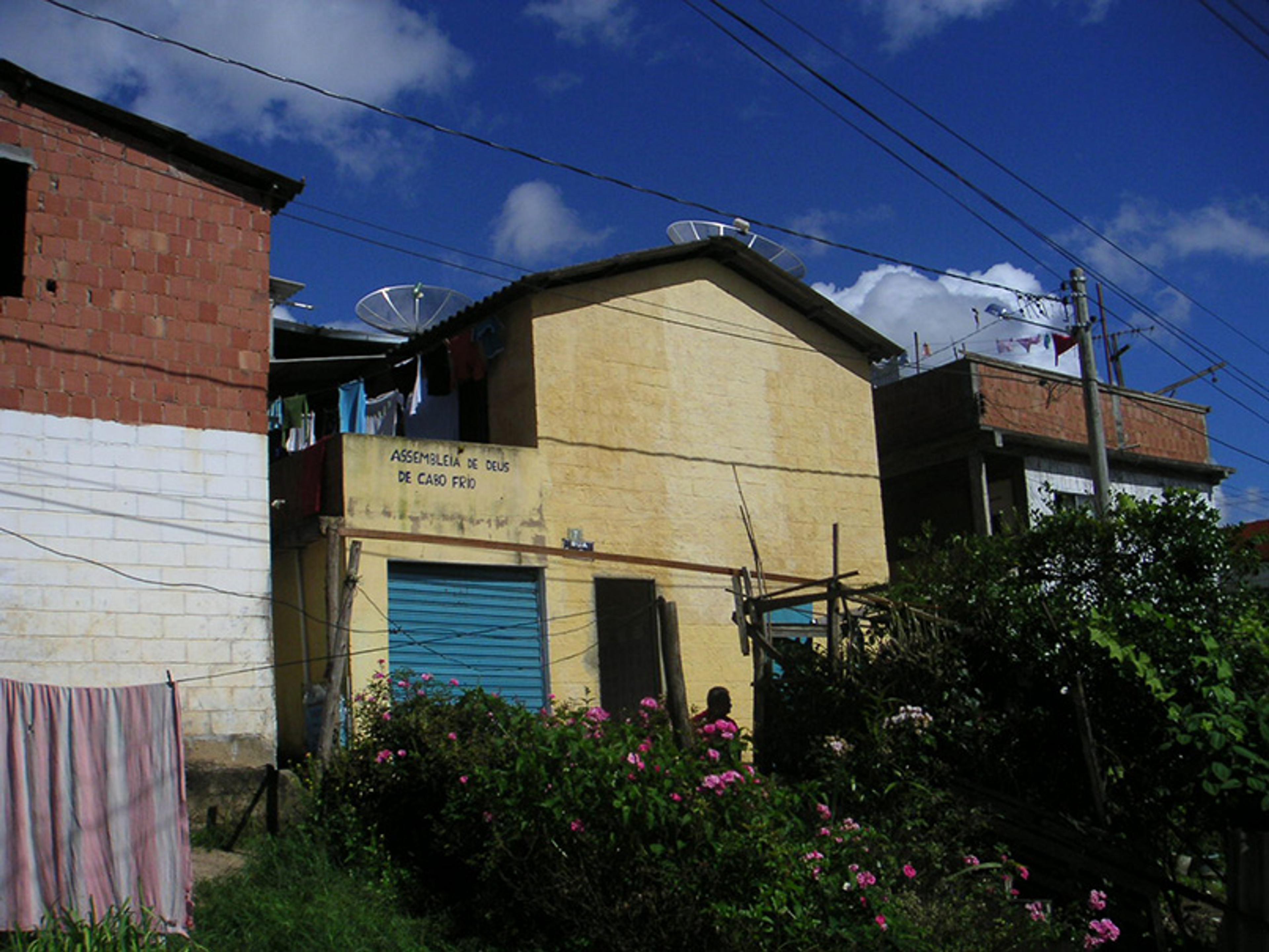
An Assemblies of God church in the city of Cabo Frio, Brazil. Photo by Nate Cull/Flickr
The model Pentecostal will be a poor assembleiano, a member of the Assemblies of God, whose small, basic and mostly ugly structures populate the landscape, from gritty industrial suburbs to lost hamlets of a dozen inhabitants deep in the interior. In these houses of worship, eschatological themes are omnipresent and the songs are about Jesus’s second coming. On the way to or back from church, worshipers – in their Sunday best – pass each other’s houses and check in on each other, reinforcing communal ties.
At the other end of the spectrum is something like the Bola de Neve Church, founded in a surf shop by a surfing pastor in 1999. Its 560 churches across a number of countries purvey something altogether ‘lighter’. Its middle-class members arrive by car, wear casual clothing, and are treated to sermons accompanied by pop-rock and reggae. Eschatological themes are largely absent. As Alencar put it to me: ‘If Jesus returned now, he’d ruin their gig.’ Accompanying the Church’s suave and sophisticated marketing is the preaching of the theology of prosperity. Turning up in an expensive imported car signals to co-religionaries that the prosperity gospel is working.
Importantly, in Brazil, ‘everything is syncretised and miscegenated,’ explains Alencar, so although in doctrinal terms the gulf between Pentecostal and neo-Pentecostal is ‘abyssal’, in practice it is hard to draw clear lines. Moreover, Baptist, Adventist and even Catholic churches are undergoing pentecostalização, adopting charismatic or revivalist features. The prosperity gospel component cuts across many of these complicated lines, a result of the emphasis on competition, individualism and economic ascent typical of neoliberal societies.
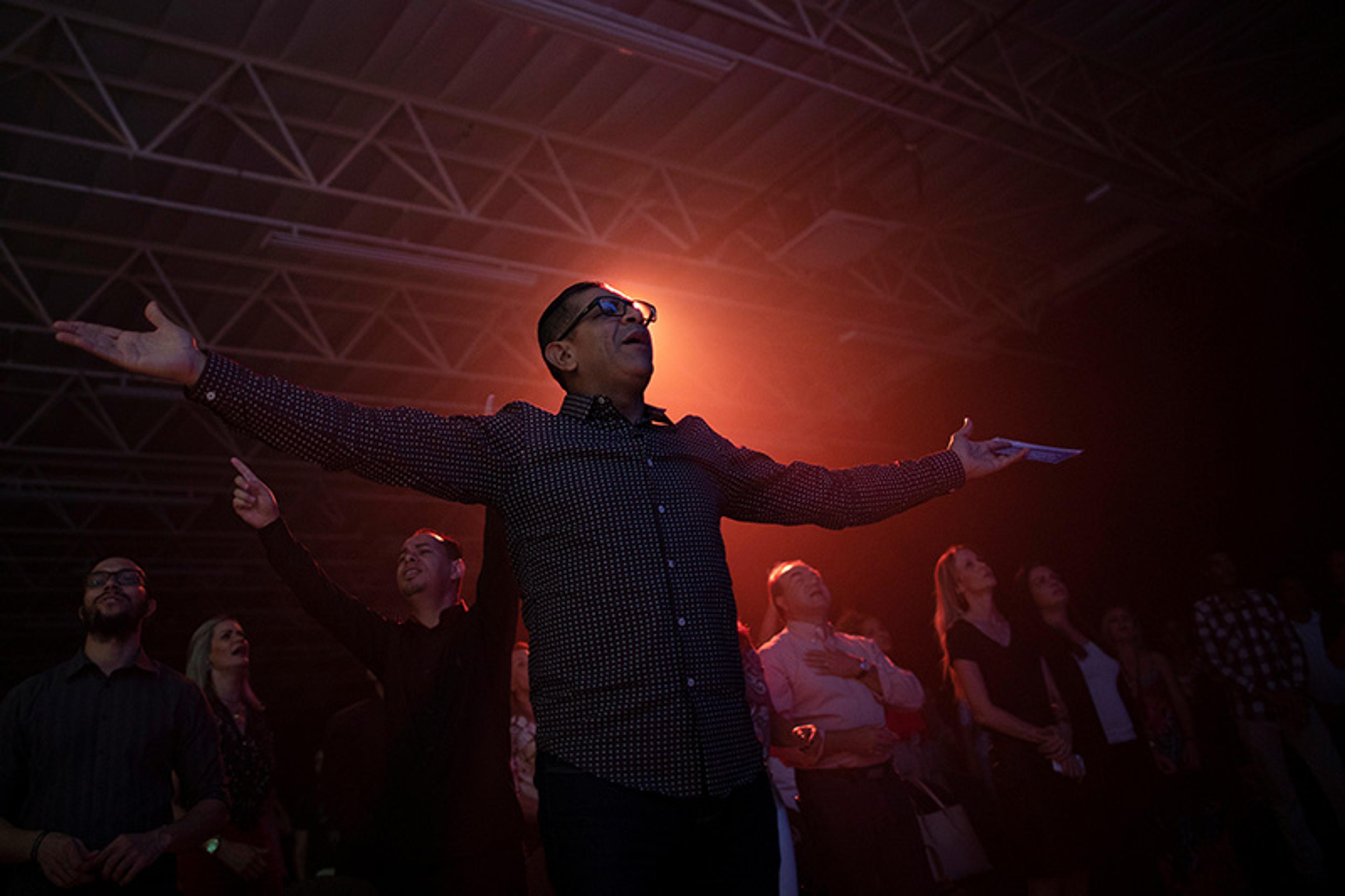
At the Ministry of the Faith church in Brasília, Brazil, September 2018. Photo by Ueslei Marcelino/Reuters
But ultimately, for all the variety, the growth of evangelical Christianity in a society as unequal as Brazil is a phenomenon of the poor and working class. Conversion and dedication promises – and, in some cases, delivers – a better life: not just money, but also in terms of relationships, family and especially health. Belief functions as a para-medicine, be it directly through faith-healing, through the belief, determination and support to beat addiction, or simply through the provision of psychological support. In the words of Davis, it is a ‘spiritual health-delivery system’. This is the reason why evangelicals tend to be urban, young, Black or Brown women, from the least schooled strata, with the lowest salaries. It is, as Davis put it, ‘the largest self-organised movement of poor urban people in the world.’
Utopian visions have attached themselves to Brazil and informed its self-conception from its European discovery through to the 20th century. Perhaps it was a coincidence, but in Thomas More’s Utopia (1516) news of a distant paradise was brought by a Portuguese sailor. Brazil was Utopia realised. As Patricia Vieira puts it in States of Grace: Utopia in Brazilian Culture (2018), it presented a ‘fantasy of easy enrichment, grounded on the perception of the region as a treasure trove of natural wealth.’
For one 17th-century Jesuit priest, the land demarcated on the east side of the Treaty of Tordesillas would be the ‘Fifth Empire’, a new kingdom of perpetual peace, where people would live in mystical communion with God, and all would have equal rights. Gradually, messianic and theologically informed visions would give way to secularised ones.
Curiously, Brazil is the only country whose demonym finishes in the -eiro suffix in Portuguese. So you have the Francês, the Argentino, the Americano, the Israelense… but the Brasileiro. It suggests an occupation, like marceneiro (carpenter), pedreiro (bricklayer), mineiro (miner). To be Brazilian was not a state of being, but an activity, a doing. It was the Portuguese and other Europeans who went off and ‘did’ Brazil – exploited its land.
The Indigenous hero is lazy – a ‘trait that Brazilians should embrace and consciously cultivate’
So the Brasileiro is one committed to the project of Brazil, they are not a mere natural feature of the land. But this also speaks to a rapacious pattern of Brazilian development, characterised by using and discarding, rather than building and consolidating. It is a subjectivity evocative of Max Weber’s ‘capitalistic adventurer’; a figure who would ‘collect the fruit without planting the tree,’ as Holanda put it. The utopian tangles with its opposite. Are we dealing with transformation or exploitation? Is the one who works the land subject or object?
Rejecting the exploited and exploiter dichotomy, a different utopian vision fixated on the independent, noble savage, free from work. The Índio was celebrated by Brazilian Romantics and modernists alike. In Macunaíma (1928), Mario de Andrade’s landmark novel mixing fantastical and primitivist elements, the eponymous Indigenous hero, a ‘hero without any character’, is above all lazy – a ‘trait that Brazilians should be proud of, embrace, and consciously cultivate,’ according to Vieira. But at issue is not really laziness but ócio – idleness. The Portuguese word for business is negócio, or the negation of idleness (neg-ócio). So, Vieira argues, the ‘business‑as‑usual work mentality of the capitalist world is at odds … with the primeval ócio of Brazilian Indigenous communities…’
The modernist poet Oswald de Andrade likewise foresaw a coming Age of Leisure, enabled by technology. In this egalitarian, matriarchal disposition, Brazil could be at the forefront of nations, showing the way. Civilising work, negócio, had been done; soon the dialectic would swing back to a paradisaical ócio.
In practice, the Índio and the adventurer were locked in conflict, but they jointly stood in contrast to the avaricious European bourgeois. It is for this reason that Holanda’s Brazilian archetype of the cordial man is, as the sociologist Jessé de Souza puts it, the ‘perfect inverse of the ascetic Protestant’.
Today’s Brazilian evangelicals are likewise not Weber’s northern European protestants. Their worship is emotional, not intellectual, filled with magic, rather than structured by reason. But pecuniary accumulation appears to unite them.
As the Left-leaning Brazilian philosopher Roberto Mangabeira Unger has noted, these are the people who ‘[go] to night school, struggle to open a business, to be an independent professional, who are building a new culture of self-help and initiative – they are in command of the national imaginary.’ A few years ago, when asked about Left-wing rejection of the entrepreneurial, evangelical sector, Unger replied that the Brazilian Left should not repeat the ‘calamitous trajectory’ of their European counterparts in demonising the petty bourgeoisie and distancing themselves ‘from the real aspirations of workers’.
This neo-Pentecostal consumer-capitalist utopia is necessarily authoritarian
The ‘neo-Pentecostal movement today flourishes in a context of dismantling of labour protections,’ argues Brazil’s leading scholar of precarity, Ruy Braga. This requires less a methodical dedication to work, and more the neoliberal self-management typical of popular entrepreneurship. We are dealing not with the Protestant work ethic, but with an evangelical speculative ethic. Quantification becomes the criteria of validation, be it for believers or churches competing in the religious marketplace. ‘Blessings are consumed, praises sold, preaching purchased,’ as Alencar puts it.
Whether this is mere capitalist survival or somehow utopian depends on whether you agree with the Catholic theologian Jung Mo Sung’s assertion that evangelicals insert a metaphysical element – perfectibility; the realisation of desire through the market for those who ‘deserve’ it – into mundane society. For a critic of the prosperity gospel like Sung, this neo-Pentecostal consumer-capitalist utopia is necessarily authoritarian. Divine blessing – manifest through the crente’s increased purchasing power – is bestowed as a result of the believers’ spiritual war against the enemies of God: the ‘communists’ and the ‘gays’.
The ‘communists’ (who might in fact just be centrist progressives or Catholics) want to give money to the poor; these in turn may be sinners (drug users or traffickers, for instance). This goes against the way that God distributes blessings, which is to favour, economically, those who follow the prosperity gospel.
According to most accounts, a unifying element in the evangelical cosmology is the confrontation between good and evil. The fiel (faithful) encounters a binary: the ‘world’ (sin, violence, addiction, suffering, evil – the Devil around every corner) vs the ‘Church’ (the negation of all that). This code is efficient in affording psychic peace to those facing a complex, rapidly changing world.
How stark is the contrast with earlier self-understandings of Brazilian culture in which ambiguity prevailed! Brazil apparently lacked a moral nexus (as the historian Caio Prado Jr saw it in the 1940s), it was a society of ‘corrosive tolerance’ (according to the literary critic Antônio Cândido in the 1970s) or represented a ‘world without guilt’ (said another literary critic, Roberto Schwarz, in the 1980s).
Outsiders, too, remarked on the absence of moral depth and pure religion. Two 19th-century American missionaries, James Fletcher and Daniel Kidder, lamented in Brazil and the Brazilians (1857) that that this natural paradise could have been a moral paradise, were it not for the fact that tropical Catholicism was superficial, pagan, and hung up on feasts and saints. North Americans of the time learned that the Brazilian was ‘amiable, refined, ceremonious’, but also that the absence of stricter moral codes led him to be ‘irresponsible, insincere and selfish’.
The emblematic Brazilian figure, another archetype, is the malandro, or trickster, slacker, scoundrel. Identified by Cândido in his reading of the 19th-century novel Memoirs of a Militia Sergeant, the malandro flits between the upper and lower classes, between order and disorder, and operates on the presumption of an absence of moral judgment, sin and guilt. He does not work full-time, but nor is he a full-time criminal, nor a slave. He gets by on his wits and adapts. For Vieira, the ‘relaxed, leisurely lifestyle of the malandro, which represents the quintessentially Brazilian way of being-in-the-world, generated a society where regulations are lax, and so can be easily bent to accommodate different customs and traditions.’
Conversions are negatively impacting samba schools, with the born-again quitting carnival
The malandro is at home in carnaval, which brackets real life, allowing for play, for freedom and fantasy. In Roberto DaMatta’s classic 1979 study, the festival is a subversive, free universe of useless activity – something that looks like madness from the perspective of capitalist work ideology.
In this light, Brazil’s great religious transition represents a cultural revolution. Evangelicals interrupt the ‘utopia’ of the idle Índio or the malandro at play in carnival. Firstly, they disdain idleness in favour of entrepreneurial activity and rigorous self-discipline. Secondly, and more directly, they scorn carnival itself. As the leading Pentecostal pastor Silas Malafaia puts it, carnival is a pagan feast ‘marked by sexual licentiousness, boozing, gluttony, group orgies and a lot of music.’ This is felt at the grassroots. Folha de S Paulo reports on how conversions are negatively impacting samba schools and other musical groups, with the born-again quitting carnival.
They say Pentecostalism and neo-Pentecostalism owe their success to their adaptability to local contexts. But, at a minimum, these doctrines’ implantation in foreign soil gives voice to deep changes in the receiving culture, and at a maximum may even serve to transform it. If toleration, moral ambiguity and easy-going malleability were central to a Catholic-inflected Brazilian identity, what will an evangelical Brazil look like?
In The Making of the English Working Class (1963), E P Thompson comments that Methodism prevented revolution in England in the 1790s. Yet it was indirectly responsible for a growth in working people’s self-confidence and capacity for organisation. Could something similar be said for Brazilian evangelicals, whose self-starting community-building, at a minimum, could be looked at sympathetically for reconstructing associational life?
The Canadian political scientist André Corten, who taught and researched across Latin America, remarked that ‘the failure of secularised Utopias makes the persistence of theologised Utopias come to light.’ Pentecostalism, as a sect, is one such utopianism. It withdraws to an ‘elsewhere’ in social space, refuses to compromise with the social world, and is therefore ‘anti-political’. There is a popular-democratic thrust to this: no deference to a professionalised clergy, but rather a horizontal ordering of the faithful.
A comparison with revolutionary-democratic liberation theology is illuminating. Insofar as they construct the category of ‘the poor’, both liberation theology and Pentecostalism are discourses about suffering. But Pentecostalism privileges emotion in the place of cognition, glossolalia (speaking in tongues) in the place of equality of speech, and – crucially – it is a religion of the poor, not for the poor. It disdains poverty.
Evangelical churches ‘transform people who were born as subaltern – not just poor but also convinced that their social role is to be poor – and they are reborn: they come to understand themselves as equal to other people,’ argues Spyer. They seek to turn their back on poverty and change their lives so as to improve their station.
How does this relate to secular utopianism? It doesn’t. This democratic-popular component cannot be recycled by the Left, nor by conservatism; evangelicals may refuse infeudation to a category of scholars but, simultaneously, the intolerance and despotism of custom connote authoritarianism. This is a movement that is ‘at once egalitarian and authoritarian’, says Corten.
Is this not the obverse of the hegemonic culture, of progressive neoliberalism? Our societies are, prima facie, egalitarian: most forms of elitism and snobbery are ruled out, and we are tolerant of difference and accepting of minorities, because everything is relativised in a consumer society. But, in practice, there is a deep inequality of income, wealth, power and even recognition.
As evangelical Christianity ballooned, it would leave behind the anti-politics of the sect
So even if we are to conclude that the evangelical wave contains no utopian seeds, it is at the very least countercultural. Indeed, it was, as Alencar put it to me, ‘contestatory from the start: in their social behaviour, ways of greeting each other, their clothes, music, sport, life…’ But this was always a ‘force of transformation with no intentionality’, says Corten, making its logic distinct from the utopian ideologies of the Left.
In any case, as evangelical Christianity ballooned, it was always going to leave behind the anti-politics of the sect. Corten sketched out three political trajectories that might take shape.
One is assimilation: adapting to the reigning order of society. In formal politics, this is represented by evangelical political parties or cross-party benches behaving in physiological fashion – a term from Brazilian politics that means to become part of the organs of the state, with all the clientelism and corruption this entails.
The happy-clappy neo-Pentecostal churches like Bola de Neve would likewise represent a certain assimilation. Embourgeoisement, for evangelicals, represents not just certain churches becoming middle class, but questions over the professionalisation of the clergy, whether pastors should be paid a salary. These frictions are currently playing out among the faithful, with heated debate within churches – and competition between them.
A second entry point to politics is manipulation: this consists in evangelical leaders letting believers think that they continue to be ‘unacceptable’ while playing the political game. This might accord with the authoritarian thesis, whereby evangelical ‘despotism of custom’ fits seamlessly with secular authoritarian rule.
The third door leads to messianism. This would present the most obvious threat to liberal democracy, not (only) because it would be a species of authoritarian populism, but because ‘the solution to the conflict they displace outside themselves is sought in a “supernatural” outcome,’ argues Corten.
Critical theologians join with much Left-wing opinion in denouncing the falseness and shallowness of evangelical Christianity in its guise as prosperity gospel. Forget countercultural stances, let alone utopian visions, evangelicals are fully subsumed by contemporary capitalism! Worse still, they sustain intolerant, socially conservative attitudes!
But even this may be changing. The newsweekly Veja reports that evangelicals today ‘want to participate in the institutional decisions of their faith communities, aim for more democratic and transparent environments, and are much more flexible in behavioural matters.’ And for all the community-building of proletarian Pentecostals, the number of ‘unchurched’ is growing. In tandem, the number of evangelicals who belong to ‘undetermined’ churches is growing at the same rate as evangelicals as a whole. This would be testament to an even more total victory of the forces of commodification, atomisation, reification.
In the same river swims the data on secularisation. Those professing ‘no religion’ are increasing, reaching a plurality (30 per cent) among young people in the megalopolises of São Paulo and Rio – but these people mostly do not identify as agnostic or atheist. Indeed, 89 per cent of Brazilians ‘believe in God or a higher power/spirit’, according to the latest Global Religion survey from Ipsos.
The trend, then, is for belief without belonging, toward an individualisation of faith and the adoption of eclectic, personalised beliefs used to sustain, justify or comfort the individual subject in a competitive, anomic world. The sectarianism of the closed-off world of believers awaiting the eschaton has been corroded by the fissiparousness of liquid modernity.
Others suggest that there remains a contestatory edge to evangelicals. The anthropologist Susan Harding finds a forcible strain of anti-victimhood in Pentecostal and neo-Pentecostal churches. Indeed, this is why progressives disdain evangelicals, because, unlike other groups, they don’t see themselves as victims of the system. They are financially motivated and seek to better themselves, in contrast with the exoticised or culturally relevant poor (Indigenous communities or practitioners of Afro-Brazilian religions, for instance). For the middle-class progressive, distaste for the evangelical is mere demophobia, a rejection of the urban poor, particularly when they organise themselves.
The web of evangelical churches may represent genuine social power
True as this may be, anti-victimhood tangles in complex fashion with ressentiment, a sense of being unfairly judged or treated. In turn, this is leveraged by evangelical leaders and conservative politicians. This aspect culminates in a seeming vindication of Corten’s manipulationist theory: swampy corruption and authoritarian instincts meld with apocalyptic themes. It is a confluence that was especially evident under Bolsonaro, and the only question now is whether the constellation of forces that regrouped around him will unify again.
What isn’t going away is the social presence of evangelicals as such. But as they expand towards a plurality of the population over the next decade, internal differences and divisions will grow. Neither their politics nor their politicisation is a given. Indications from the US are that evangelicals are retreating from politics, having occupied centre-stage in the 1990s and 2000s. If religion is meant to provide solace, but becomes yet another site in which antagonisms rage, either you need to quit religion or your religion needs to quit politics.
Still, the social infrastructure represented by what is ultimately a mass movement of the poor is remarkable. The web of evangelical churches may represent genuine social power. Whether it is a carrier of mainstream capitalist values of entrepreneurship and speculation, or an anti-politics of refusal, or something else entirely, remains to be seen. Capitalism’s contradictory tendencies towards individualism and collectivity play out in full here. Brazil’s religious transition is a case of both at once.
In Who Are We? (2004), the political scientist Samuel Huntington warns that Hispanic immigration would transform US culture into something more Catholic, with a consequent demotion for Anglo-Protestant work ideology. One should not see in the advance of Pentecostalism and neo-Pentecostalism in Brazil an opposite movement. We are not simply faced with a pendulum swing from leisure to work – nor, needless to say, a utopian overcoming of that division.
Instead, urbanisation without industrialisation has created a social landscape of low-key civil war. The war of all against all finds its ideological correlate not in a Protestant work ethic but in the speculative-entrepreneurial ethic of evangelicals. In a terrible duality of overwork and worklessness, a speculative leap towards prosperity looks like the only escape. And this obtains whether one follows the rigours of evangelical dedication, studying, setting up a microbusiness on credit – or turning to a life of crime. There are plenty of cases where it’s both.
Finally then, evangelical Christianity may be the form that popular ideology takes in a context of precarity, after old utopias have dried up. All that remains is a utopia in the sense that Theodor W Adorno discussed: not as a positive social vision, but as the absence of worldly suffering. Adorno, though, was mistaken: he conflated the secular notion of freedom (liberation of our finite lives) with a religious notion of salvation (liberation from finite life).
It is the former utopianism that is lacking today – that which drags us along and keeps us walking forward. We need not surrender to the grinding banality of capitalist life for the sake of ‘realism’, nor endow tawdry capitalist creeds with the name ‘utopia’. We need only note that the desire for transcendence exists – it is manifest, in both earthly and metaphysical aspects. The worldwide explosion of Pentecostalism should give us pause, and act as an injunction to invent secular transcendence once more.
Translations from Portuguese sources are the author’s own.



